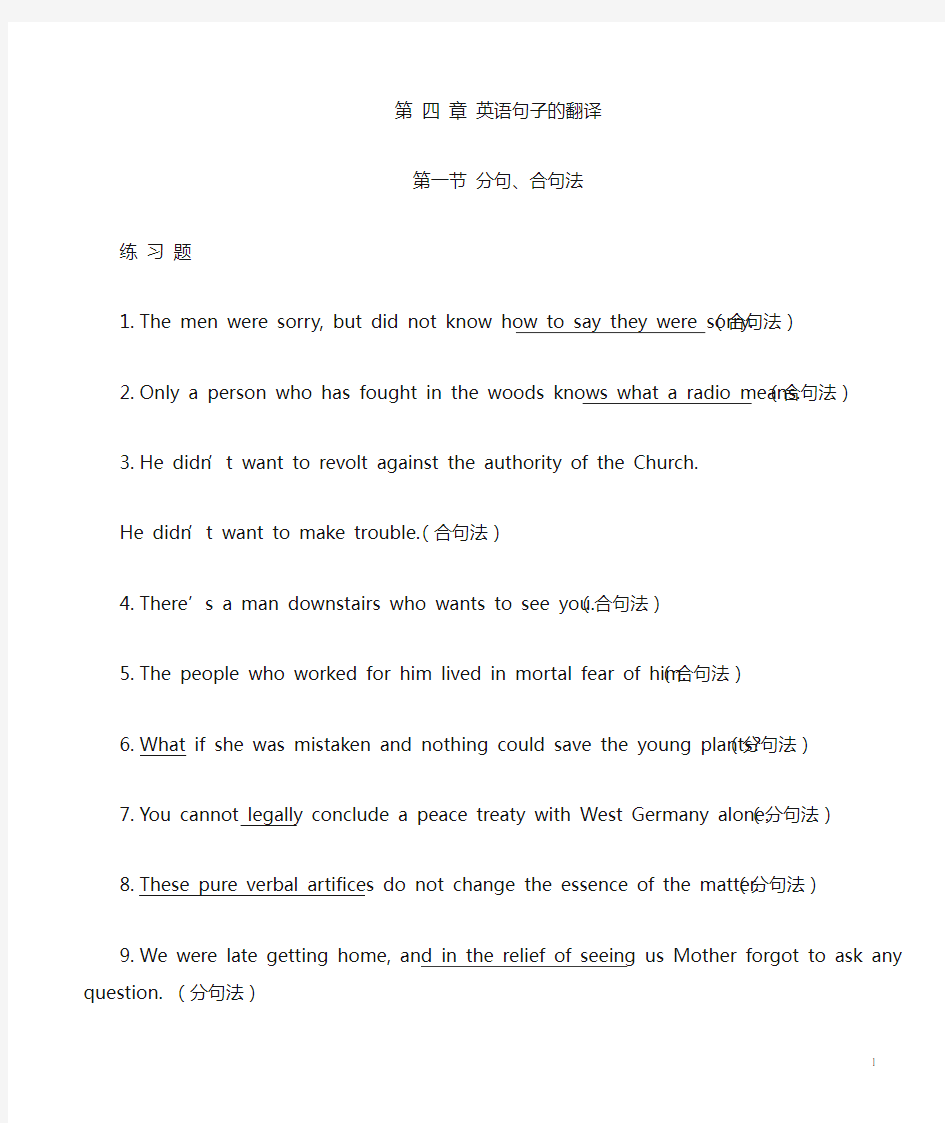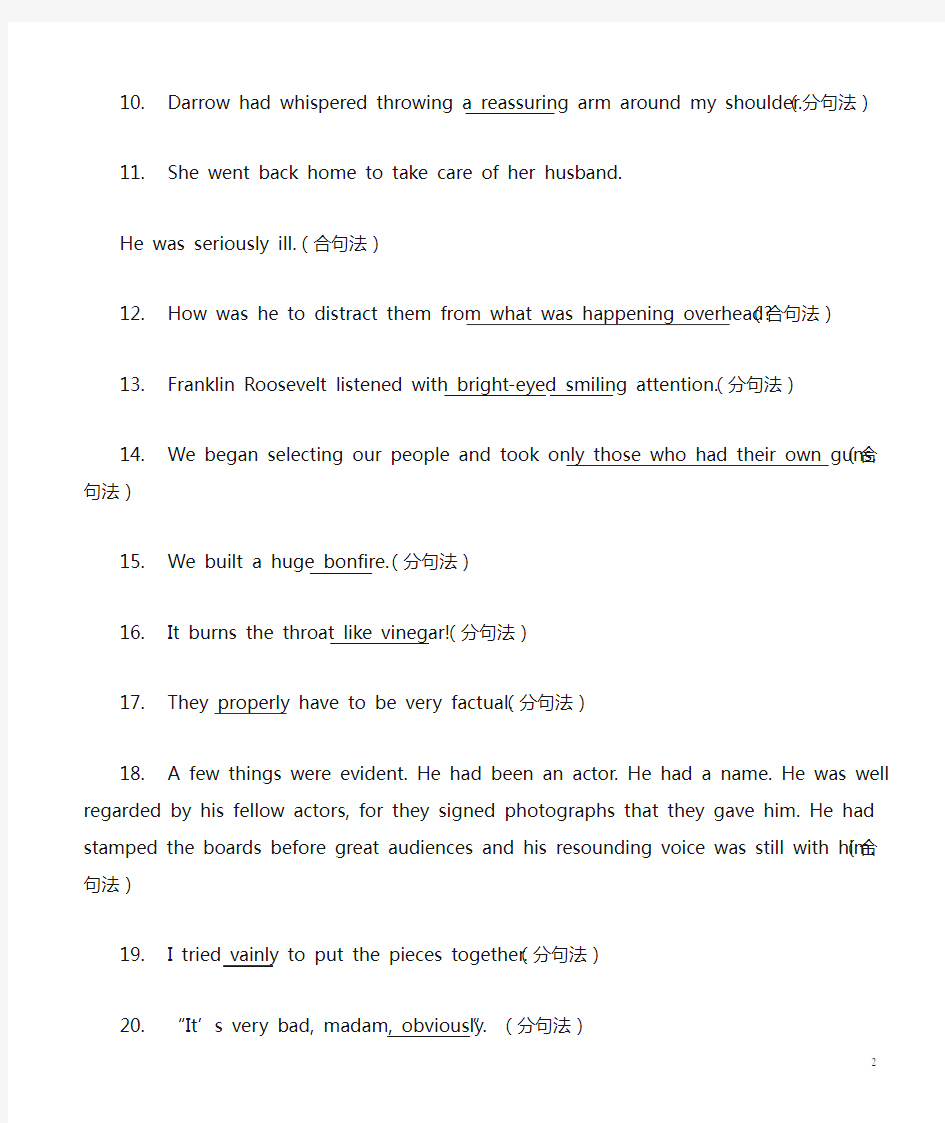第一节 分句、合句法练习


第四章英语句子的翻译
第一节分句、合句法
练习题
1.The men were sorry, but did not know how to say they were sorry.(合句法)
2.Only a person who has fought in the woods knows what a radio means. (合句法)
3.He didn’t want to revolt against the authority of the Church.
He didn’t want to make trouble. (合句法)
4.There’s a man downstairs who wants to see you. (合句法)
5.The people who worked for him lived in mortal fear of him. (合句法)
6.What if she was mistaken and nothing could save the young plants?(分句法)
7.You cannot legally conclude a peace treaty with West Germany alone. (分句法)
8.These pure verbal artifices do not change the essence of the matter. (分句法)
9.We were late getting home, and in the relief of seeing us Mother forgot to ask any question. (分句法)
10.Darrow had whispered throwing a reassuring arm around my shoulder. (分句法)
11.She went back home to take care of her husband.
He was seriously ill. (合句法)
12.How was he to distract them from what was happening overhead? (合句法)
13.Franklin Roosevelt listened with bright-eyed smiling attention. (分句法)
14.We began selecting our people and took only those who had their own guns. (合句法)
15.We built a huge bonfire. (分句法)
16.It burns the throat like vinegar! (分句法)
17.They properly have to be very factual. (分句法)
18.A few things were evident. He had been an actor. He had a name. He was well regarded by his fellow actors,
for they signed photographs that they gave him. He had stamped the boards before great audiences and his resounding voice was still with him. (合句法)
19.I tried vainly to put the pieces together. (分句法)
20.“It’s very bad, madam, obviously.”(分句法)
21.He expected, not unnaturally, that his father would help him. (分句法)
22.That is a NATO matter and any comment on it should appropriately come from NATO. (分句法)
23.The young are admittedly better educated and not so dependent on their parents. (分句法)
24.“An unhappy alternative is before you…Elizabeth…”(分句法)
25.The President gave Victor Henry a hearty handshake, his grip warm and damp. (分句法)
26.Nixon was greatly impressed by Stassen’s firm handshake. (分句法)
27.She is very busy at home. // She has to take care of the children and do the kitchen work. (合句法)
28.Darkness fell. // An explosion shook the earth. // It did not shake his will to go to the front. (合句法)
29.Her father became the mayor of the city. // He was a murderer in the Second World War. (合句法)
30.Throughout his life, Benjamin Franklin continued his education, learning from human contacts as well as
from books. (分句法)
31.His failure to observe the safety regulations resulted in an accident to the machinery. (分句法)
32.It is necessary that he (should) speak.
33.There on the snow was a newspaper. She unfolded it. It looked familiar. It was The Times. (合句法)
34.On the surface, then; all was well that ended well.
35.Personally, I see no objection to your leaving at once. (分句法)
36.Briefly, there is nothing new in his story. (分句法)
37.Surely I have met you before somewhere. (分句法)
38.Curious, we looked around for other guests. (分句法)
39.His visit gave me a pleasant surprise. (分句法)
40.Indeed, they were defeated, but it was victorious defeat. (分句法)
41.Sometimes, to his delight, he was allowed to take short trips outside Charleston Harbor. (分句法)
42.All citizens who have reached the age of eighteen have the right to vote and to stand for election, with the
exception of persons deprived of these rights by law. (分句法)
43.The lion eats the zebra that eats the grass.
44.The snake catches the toad that eats the insect that nibbles the green leaves.
45.Such fear is not as far-fetched as it may seem.
46.They prolonged the clasp for the photographer, exchanging smiling words. (分句法)
1
分句与合句法
分句法、合句法 英汉两中语言在句法结构存在很大差异。英语重形合,连接词较为发达,句子结构层层包孕,叠床架屋,句子在空间上呈大树型结构,长句较多;汉语重意合,句子与句子之间缺乏必要的连接词,积词成句,积句成章,流水句较多,呈线型排列,一句接一句,短句较多,句子结构呈竹竿型分布。针对英汉句子结构的不同特征,在翻译时要根据各自的语言习惯作响应的转换,以确保译文通顺流畅。 在进行英汉翻译时,有时我们可以把原文的整个句子结构保存下来或稍加些许改动即可。但在多数情况下,需对原句子作较大的改动以符合目的语的表达习惯。分句法和合句法就是改变句子结构的两种重要的方法。 所谓分句法是指把原文的一个简单句译成两个或两个以上的句子。 所谓合句法是指把原文两个或两个以上的简单句或一个复合句在译文中用一个简单句来表达。
一、分句法 (—)副词的分译 1)The Chinese seemed justifiably proud of their economic achievements. --中国人似乎为他们经济建设上取得的巨大成就感到自豪,这是合乎情理的。 2)Jerry quickly ordered everyone to put on life jackets, and tried unsuccessfully to put out the fire. --杰里立即叫大家穿上救生衣,并且奋力灭火,但却无济于事。 They, not surprisingly, did not respond at all. (adv.) 他们根本没有答复,这是不足为奇的。 She wished she were at Kangding. Ordinarily, she would have been here two hours ago. ( adv.) 她真愿意那时已在康定。要是在平常的日子里,她早已到康定三个小时了。 Characteristically, Mr. Smith concealed his feelings and watched and learned. 史密斯先生没有表露自己的感情,只是察言观色,心领神会,这是他的特点。
分句法与合句法练习(1)
分句法与合句法练习: 注意以下副词,形容词和短语的分译 1.He wished he were at home. Ordinarily, he would have been there three hours ago. 他真愿那时候已在家里了。要是在往常的日子里,他早已到家三小时了。 2.illogically, she had expected some kind of miracle solution. 3.她想会有某种奇迹般的解决办法。这是不合情理的事。 4.But, occasionally, through haste or carelessness, mistakes were made, so that at the end of business day one teller would be short on cash, the other long. 5.但是,偶尔也会有这种情况,由于匆忙或者粗心,而造成错误,结果当天停业结算时, 有的出纳会少了钱,而另一个会多了。 6.Characteristically, Mr. Li concealed his feelings and watches and learned. 7.哈罗德先生没有表露自己的感情,只是察言观色,心神领会。这是他的特点 8.He stalked away, but with a gnawing uncertainty in his breast. 9.他昂首阔步地走开,心里半信半疑,感到十分苦恼。 10.The inside of each tent depended on the personality of its occupant. 11.每个帐篷的内部怎样布置,要看各个居住者的性格了。 12.He was lying on his side watching her. 13.他侧身躺着,注视着她。 14.Doctors and men both talked about a miracle drug constantly almost with awe. 15.医生们和几个男的不停地谈论一种神奇的药物,面目严肃。 16.John still smiled but his voice had a little bit of irritation in it, unusual to Rob. 17.约翰仍然面带微笑,但是不同于罗布的是他言语里面略带愤怒。 18.He arrived in Washington at a ripe moment internationally. 19.他来到华盛顿时,就国际形势而言,是个好时机。 20.His failure to observe the safety regulations resulted in an accident to the machinery. 21.他没有遵守安全守则从而导致机器出了事故。 22.As a place to live, it left much to be desired. As a secret training base for a revolutionary new plane, it was an excellent site, its remoteness effectively masking its activity... 就住而言,它还需要改进。作为一个新型的革命飞机,它是一个极好的秘密训练基地,因为它地势偏远,有效地掩盖了飞机飞行活动。 翻译下列定语从句, 23.He managed to raise a crop of 200 miracle tomatoes that weighed up to two pounds each. 24.他竟然奇迹般种出了200个西红柿,每个重达2英镑。 25.There was something original,independent,and heroic about the plan that pleased all of them。 26.这个计划里有新颖,独立,英勇的想法,他们非常满意。 27.My assistant,who had carefully read through the instructions before doing his experiment, could not obtain satisfactory results,because he followed them mechanically。 28.在未做实验之前,我的助手认真的读了说明,但是却没得到满意的结果,因为他只是机 械性的照搬。 29.The imperialist states maintain enormous armies and gigantic navies which are used for oppressing and exploiting the people in distant lands。 30.帝国主义国家为了镇压和剥削遥远地区的人们,保持了大量巨大的军队和海军。
分句、合句法翻译
第四章分句、合句法 教学目的:让学生了解如何运用分句、合句译法 重点、难点:单词和复合句的分句、合句译法 方法:讲解、提问、讨论 教学步骤 分句、合句法 定义 分句法---把原文的一个简单句译成两个或两个以上的句子。 合句法---把原文两个或两个以上的简单句或一个复合句在译文中用一个单句来表达。分句法 把原文中的一个单词译成句子,使原文的一个句子分译成两个或两个以上的句子。副词 The Chinese seemed justifiably proud of their economic achiev ements. 译文:中国人似乎为他们在经济上取得的成就而自豪,这是合乎情理的。 Incidentally, I hope to get better medical treatment in these countries than I can Possibly get here in the United Stated. 译文:我希望能在这些国家得到比我在美国这里所能得到的更好的治疗。 They, not surprisingly, did not respond at all. 译文:他们根本没有答复,这是不足为奇的。 He wished he were at home. Ordinarily, he would have been the re three hours ago. 译文:他真愿那时候已在家里。要是在往常的日子里,他早已到家三小时了。 Illogically, she had expected some kind of miracle s olution. 译文:她满想会有某种奇迹般的解决办法。这是不合情理的事。 But, occasionally, through haste or carelessness, mistakes we re made, so that at the end of the business day one teller wo uld be short on cash, the other long. 译文:但是,偶尔也有这种情况,由于仓促匆忙或者粗心大意而造成错误,结果当天停业结算时,有的出纳会短了现金而另一个却会多了现金。 形容词 Chairman Mao might have spoken with understandable pride of h i s policy of “self-reliance”. 译文:毛主席在谈到他的“自力
第一节 分句、合句法练习
第四章英语句子的翻译 第一节分句、合句法 练习题 1.The men were sorry, but did not know how to say they were sorry.(合句法) 2.Only a person who has fought in the woods knows what a radio means. (合句法) 3.He didn’t want to revolt against the authority of the Church. He didn’t want to make trouble. (合句法) 4.There’s a man downstairs who wants to see you. (合句法) 5.The people who worked for him lived in mortal fear of him. (合句法) 6.What if she was mistaken and nothing could save the young plants?(分句法) 7.You cannot legally conclude a peace treaty with West Germany alone. (分句法) 8.These pure verbal artifices do not change the essence of the matter. (分句法) 9.We were late getting home, and in the relief of seeing us Mother forgot to ask any question. (分句法) 10.Darrow had whispered throwing a reassuring arm around my shoulder. (分句法) 11.She went back home to take care of her husband. He was seriously ill. (合句法) 12.How was he to distract them from what was happening overhead? (合句法) 13.Franklin Roosevelt listened with bright-eyed smiling attention. (分句法) 14.We began selecting our people and took only those who had their own guns. (合句法) 15.We built a huge bonfire. (分句法) 16.It burns the throat like vinegar! (分句法) 17.They properly have to be very factual. (分句法) 18.A few things were evident. He had been an actor. He had a name. He was well regarded by his fellow actors, for they signed photographs that they gave him. He had stamped the boards before great audiences and his resounding voice was still with him. (合句法) 19.I tried vainly to put the pieces together. (分句法) 20.“It’s very bad, madam, obviously.”(分句法) 21.He expected, not unnaturally, that his father would help him. (分句法) 22.That is a NATO matter and any comment on it should appropriately come from NATO. (分句法) 23.The young are admittedly better educated and not so dependent on their parents. (分句法) 24.“An unhappy alternative is before you…Elizabeth…”(分句法) 25.The President gave Victor Henry a hearty handshake, his grip warm and damp. (分句法) 26.Nixon was greatly impressed by Stassen’s firm handshake. (分句法) 27.She is very busy at home. // She has to take care of the children and do the kitchen work. (合句法) 28.Darkness fell. // An explosion shook the earth. // It did not shake his will to go to the front. (合句法) 29.Her father became the mayor of the city. // He was a murderer in the Second World War. (合句法) 30.Throughout his life, Benjamin Franklin continued his education, learning from human contacts as well as from books. (分句法) 31.His failure to observe the safety regulations resulted in an accident to the machinery. (分句法) 32.It is necessary that he (should) speak. 33.There on the snow was a newspaper. She unfolded it. It looked familiar. It was The Times. (合句法) 34.On the surface, then; all was well that ended well. 35.Personally, I see no objection to your leaving at once. (分句法) 36.Briefly, there is nothing new in his story. (分句法) 37.Surely I have met you before somewhere. (分句法) 38.Curious, we looked around for other guests. (分句法) 39.His visit gave me a pleasant surprise. (分句法) 40.Indeed, they were defeated, but it was victorious defeat. (分句法) 41.Sometimes, to his delight, he was allowed to take short trips outside Charleston Harbor. (分句法) 42.All citizens who have reached the age of eighteen have the right to vote and to stand for election, with the exception of persons deprived of these rights by law. (分句法) 43.The lion eats the zebra that eats the grass. 44.The snake catches the toad that eats the insect that nibbles the green leaves. 45.Such fear is not as far-fetched as it may seem. 46.They prolonged the clasp for the photographer, exchanging smiling words. (分句法) 1
homework(分合句法兼容)
Homework (分句合句法) 1.This design with all its disadvantages is considered to be one of the best. 2.He unnecessarily spent a lot of time introducing this book, which the students are familiar with. 3.They remarked now he took a different seat from that which he usually occupied when he chose to attend divine worship. 4.She was born in a very small town. The town is in the north of China near the sea. 5. It was midnight, and there were few people on the street. 6.They tried to stamp out the revolt, which spread more furiously throughout the country. 7.She went back home to take care of her husband. He was seriously ill. 8.You will supply financial power, and we’ll supply man power. Isn’t that fair and square? 9.瘾君子对那些“严禁吸烟”的布告牌视而不见,真是不可救药。 10.她隔窗望去,突然发现有只小船停泊在河边,船里有位船夫睡得正香。 11.The night, clear and starry, sparkled darkly, and the opaque, lightless shifting patches slowly against the low stars were the drifting islets. 12.Those who judged of his ultimate success by the failure of his first attempt were agreeably disappointed. 13.The wheels scooped up stones which hammered ominously under the car. 14.The inside of each room depended on the personality of its occupants. 15.他用辛辛苦苦积攒了五年的钱买了一架照相机。然后,他带着它走遍全国,拍摄了许多 祖国名胜古迹的照片。 16.我国人口众多,人均资源有限,资金不足。发展精加工高附加值的产品出口,是今后扩 大出口的一个关键。 17.中国是个大国,百分之八十的人口从事农业,但耕地只占土地面积的十分之一,其余为 山脉、森林、城镇和其他用地。 18.If people mean anything at all by the expression “untimely death”, they must believe that some deaths run a better schedule than others. Death in old age is rarely called untimely —a long life is thought to be a full one. But with the passing of a young person, one assumes that the best years lay ahead and the measure of that life was still to be taken.
